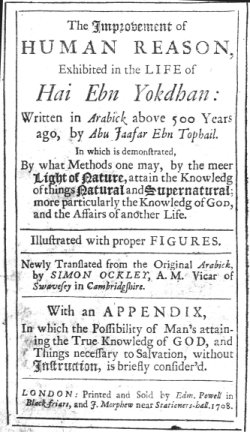
What would happen to a child growing up on an island outside any human society? In real life such a scenario would be absurd. No child could survive from birth on his or her own, despite exotic accounts of feral human babies being reared by animals. But as a thought experiment, it makes an intriguing story. Such is the philosophical fable spun by the Andalusian Muslim scholar Ibn Tufayl over eight centuries ago. I have just finished teaching this text and the lessons in it are fresh in my mind.
If you have never read this classic fable, it can be found online in the original 1708 translation into English by Simon Ockley. A more recent translation by Lenn Evan Goodman is available from Amazon. The author was a distinguished Muslim intellectual who borrowed from the earlier Greek icons Aristotle and Plato, as well as the commentaries by earlier Muslim philosophers like Ibn Sina (Avicenna) and al-Farabi. His fable combines logical arguments, inductive scientific observation and a form of intuition that leads to a union with the One.
The basic plot revolves around one Hayy ibn Yaqzan (the living one who is wide awake), who arrived at an island off the coast of India either in a basket as an unwanted child or by spontaneous generation from the perfect environment for transforming mud into human tissue. The details given on the possibility of a human body being formed naturally out of bubbling mud suggest that this was not merely a fanciful trope for Ibn Tufayl. The young Hayy is nursed by a doe, who raises him as her own child. When she dies, the curious and grieving Hayy tries to figure out where her “hurt” is. He performs an autopsy and using logic investigates the chambers of the heart, coming to the conclusion that the life force had been housed in one of the chambers. Earlier Ibn Tufayl speculated that when Hayy’s body was forming through a bubbling process it reached a stage where God breathed into it and made it a living soul.
The life of Hayy is a tribute to the triumph of human reason to make sense of the physical world and arrive at the conclusion that there must be a First Cause. This is a principle that Hayy comes to via reason rather than revelation. Indeed he comes to believe in the existence of a soul and God gradually until the final realization that his fulfillment would be total submission to the One. Ironically, Hayy has become a Muslim on his own after seven seven-year stages and then encounters a societal Muslim with all the rules from another island. After visiting that island and seeing the materialist state of its religious followers, Hayy returns to his secluded island to commune with God. His logic had brought him further than the mass religion practiced by Muslims on the other island.
This is not a simple fable, as later Enlightenment scholars from Rousseau to Locke realized. It is a blueprint for rational thought, despite the mystical ending. Logic is never abandoned, but is shown to lead to the same positive union as a true follower (and how rare they are) of the revealed Islam would have. It was a lot easier to dream up a form of theistic evolution, which is what the spontaneous generation narrative suggests, almost a millennium ago. The logic of Aristotle that there could be no infinity of causes combined neatly with the Neo-Platonic doctrine of emanation from the One.
It is far more problematic to combine the findings of modern scientific research on our evolutionary origins with the creationist scenarios found in the sacred texts of Judaism, Christianity and Islam, although the Qu’ran does not refer to the rib beginning of Eve. But the lesson of Ibn Tufayl’s text is less about what was known about human origins than the need to probe such questions through logic and inductive observation. The Hayy in Ibn Tufayl’s tale found union with the One God, but he arrived at the stage of faith through reason rather than attacking rational thinking. If Ibn Tufayl was alive today, his tale might end with a different kind of union. One would hope that lessons about the universe are learned and knowledge improves as multiple centuries pass. I believe a modern day Hayy would be a geneticist, not a cleric stuck in the past. This is a fable begging to be updated.